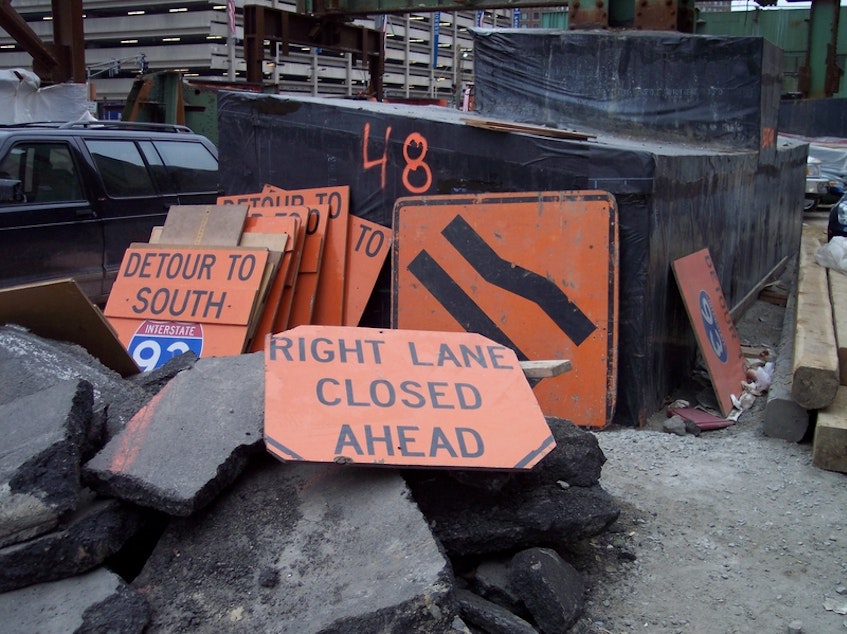Seattle Tunnel Partner Wins $80 Million Dispute Over Boston’s Big Dig

One of the two companies attempting to dig a highway tunnel beneath the Seattle waterfront has won an $80 million dispute with the Massachusetts Department of Transportation.
California construction firm Tutor Perini and Spain’s Dragados S.A. are the two halves of the Seattle Tunnel Partners joint venture. Tutor Perini was one of the main contractors on Boston’s Big Dig, which built eight miles of tunnels and bridges in central Boston.
The $24 billion Big Dig also became the poster child for delays and cost overruns on highway megaprojects.
In June, Massachusetts Superior Court Justice Thomas Billings awarded $80 million to Tutor Perini and its joint-venture partners for some of those cost overruns.
It was a complicated case: The parties submitted more than 12,000 pages of documents to the court.
Sponsored
In the end, the judge said Massachusetts and its taxpayers were responsible for those cost overruns, not the Tutor Perini joint venture.
The judge agreed with an expert panel set up specifically to resolve disputes on the Big Dig.
MassDOT officials had treated that dispute review board’s findings as recommendations only and had rejected findings that called for MassDOT to foot the bill on 29 disputed cost overruns.
“This decision certainly vindicates our position and the vigor with which we pursued this litigation over all these years,” a company press release quoting CEO Ronald Tutor stated.
The Sylmar, California-based firm paid Tutor $8.7 million last year, including $800,000 worth of personal use of the company jet, according to Tutor Perini’s filings with the Securities and Exchange Commission.
Sponsored
The Seattle Times reports that Tutor Perini has a reputation for aggressively pursuing lawsuits when projects cost more than expected or otherwise turn south.
It doesn’t always win. In June, workers started to tear down a half-built resort hotel that Tutor Perini had erected on the Las Vegas Strip, according to the Las Vegas Review-Journal.
After Tutor Perini had finished 26 floors of its 47-floor Harmon hotel for MGM Resorts International, inspectors declared the structure unsound. Tutor Perini initially said the flawed building could be repaired, but a judge approved the demolition plan in May.
Tutor Perini spokesman Jorge Casado declined to answer questions about the Big Dig case. So did MassDOT spokesman Michael Verseckes, citing pending litigation.
“There’s always the potential for a dispute or a disagreement on any contract,” said Matt Preedy with the Washington State Department of Transportation. “It could be a small contract, a large contract -- usually, the larger the contract, the larger the dollar value of the issues.”
Sponsored
WSDOT officials say their downtown Seattle tunnel project is very different from Boston’s Big Dig, with its multiple tunnels and bridges.
One thing they have in common: both set up many-layered processes to resolve any disagreements between the people building the project and the people paying for it.
“The way we like to set up contracts is to provide multiple opportunities to resolve the nature of the dispute before going to court,” Preedy said. “If we’re able to do that, it usually saves time and money for all parties involved.”
Among other disputes, Seattle Tunnel Partners and WSDOT are currently at odds over who’s responsible for an estimated $125 million needed to repair Bertha, the project’s broken tunnel machine. That dispute hasn’t gone to the project’s three-member dispute-review board yet.
Unlike the Big Dig’s dispute review board, the Alaskan Way Viaduct replacement project’s board can only make recommendations; its decisions are not binding.
Sponsored
The $80 million Big Dig dispute lasted 15 years, and the tug of war on Big Dig overruns continues. The actual construction in central Boston finished nearly a decade ago.
With disputes over Seattle’s tunnel project likely to wind through negotiations, expert panels, arbitrators and even the courts, it could be a long time before anyone knows how much Seattle’s waterfront tunnel will actually cost taxpayers.

